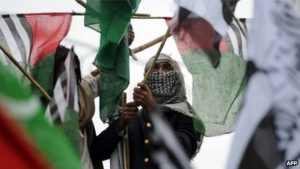Banned Groups Resurging With New Names
Wednesday, June 8th, 2016 7:47:58 by modousarr
The government has implemented measures to maintain control over banned organizations that continually resurge under different pseudonyms and new aliases as a way to challenge the state’s authority.
The interior minister has the mandate to consider whether any group ought to be banned under the Anti-Terrorism Act of 1997. However, that is not their only job. It is also meant to monitor such organisations and bar them from resurfacing.
Nevertheless, the ministry has not succeeded in taking solid action in restraining the actions done by groups beyond just adding their name to a central list.
The ministry handed over a list of banned organisations to the Senate in December 2015 which contained 61 names. The list has been kept confidential and has not been updated ever since.
One of the notorious organisations known for getting past the government’s restrictions by renaming themselves is the Sipah-e-Sahaba Pakistan (SSP). It was initially banned on January 22, 2002. It later re-emerged as Millat-e-Islami before it was again banned by the government in November 2003.
That did not manage to stop the group who succeeded in resurfacing as Ahl-e-Sunnat Wal Jamaat (ASWJ).
Although the ASWJ were banned in February of 2012, it managed to defy that ban by hosting random activities across the country with no regard to punishment from the state.
In the same vein, the Hafiz Saeed-led Lashkar-e-Taiba (LeT) was banned in 2002. Saeed and the group reinvented themselves under the heading of Jamaat-ud-Dawa (JuD) and extended their operations to large charity network as well. Regardless of the sanction placed on them by the United Nations, the group has only been placed under ‘observation’ by the government while Saeed, the group’s chief, remains in the spotlight with his public speeches being delivered all around the country.
Jaish-e-Muhammad (JeM) who was accused of executing deadly attacks in India was initially banned in January 22, 2002. Within a short time, the group resurged with the new name of Khuddam-ul-Islam. That group was later banned by the group on November 15, 2003. Despite the ban, the group remains in operation although in the shadows.
Moreover, another banned organization which was first banned in January of 2002 was Tehreek-e-Jaafria Pakistan (TJP). It late became popular with a new title, Islami Tehreek Pakistan. Again, it was proscribed on November 15, 2003.
The executive director of Centre for Research Security Studies (CRSS), Imtaiz Gul reported that the cause of such issues was due to the poor enforcement of the law.
Further, he mentioned that the seventh point of the government’s National Action Plan (NAP) specifically refers to the re-emergence of banned organisations under different titles.
“These outfits don’t require registration to operate and they rename themselves to avoid surveillance from security agencies,” Gul says.
“We have an existing framework of law and the only thing we need is enforcement of law through consolidated efforts.”
Tags: Proscribed groupsShort URL: https://www.newspakistan.pk/?p=53227

















